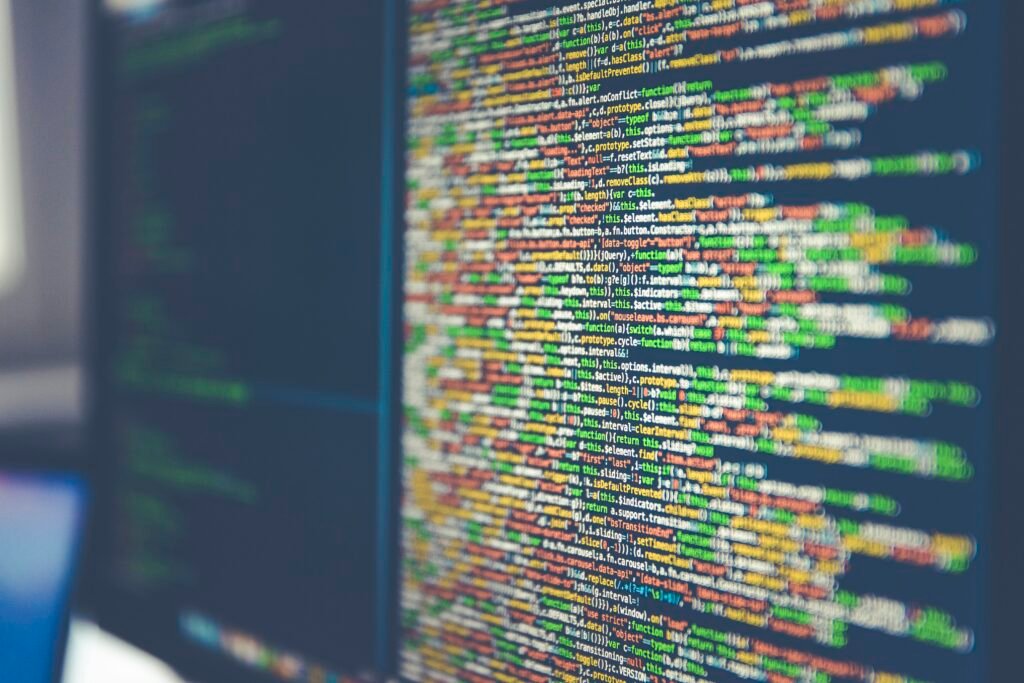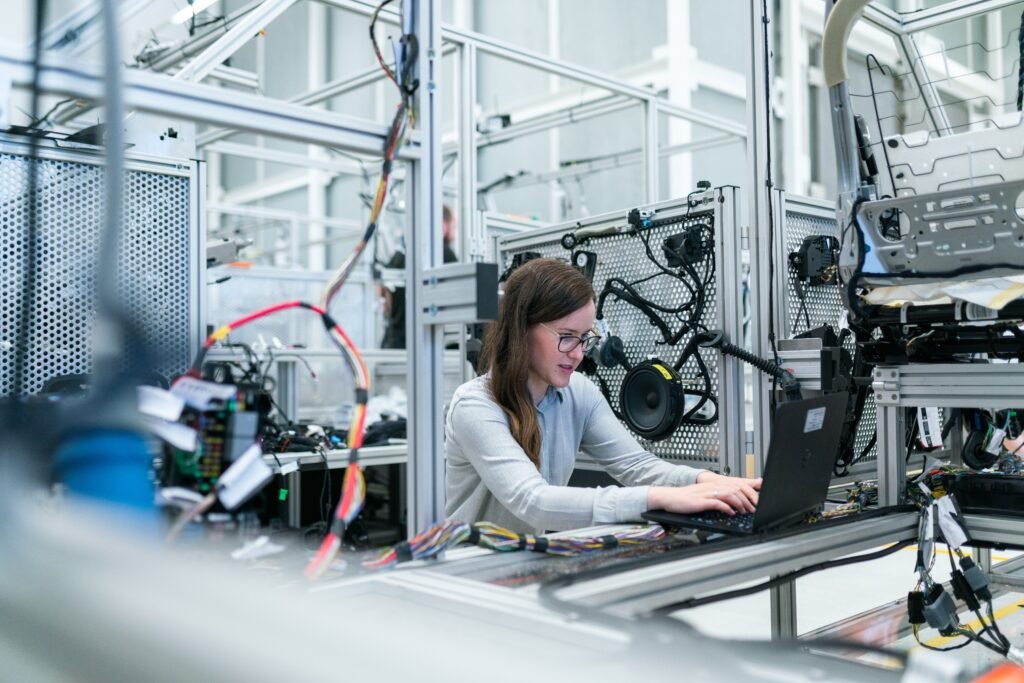Artificial intelligence, commonly known as AI, was created to revolutionize the way we interact with technology and enhance its capabilities. Developed by brilliant minds, AI aimed to mimic human intelligence and perform tasks with unparalleled efficiency. This groundbreaking technology holds immense potential to solve complex problems, automate mundane tasks, and even create new possibilities in various industries.

The Origins of Artificial Intelligence
Artificial Intelligence (AI) has its roots in the desire to mimic human intelligence and create intelligent machines capable of performing tasks that would typically require human intelligence. The concept of AI emerged from a combination of advancements in computer science, mathematics, and neuroscience. By studying how the human brain processes information and makes decisions, scientists and researchers sought to replicate these capabilities in machines.
Mimicking Human Intelligence
At its core, AI aims to replicate the cognitive abilities of humans, such as understanding natural language, recognizing patterns, learning from experience, and making decisions based on logic and reasoning. By imitating human intelligence, AI systems can perform complex tasks that would otherwise be challenging or impossible for traditional computing methods.
Automation and Efficiency
Another driving force behind the development of AI is the desire for automation and efficiency. From the earliest machines invented during the Industrial Revolution to the present-day era of digital transformation, there has been a constant drive to automate repetitive and mundane tasks, freeing up human resources for more creative and complex endeavors. AI offers the promise of automating tasks that require intelligence, leading to increased productivity and efficiency in various industries.
Scientific Research and Exploration
AI has also been propelled by the need for scientific research and exploration. From analyzing massive amounts of data to exploring distant planets, AI can assist scientists in pushing the boundaries of knowledge and understanding. By equipping machines with intelligence, researchers are able to leverage AI algorithms to process vast amounts of data, identify patterns, and make predictions, accelerating the pace of scientific discovery and exploration.
The Evolution of Artificial Intelligence
Artificial Intelligence has evolved significantly since its inception, experiencing breakthroughs and advancements in different key areas. These advancements have shaped the current capabilities and applications of AI.
Early Concepts and Theories
The origins of AI can be traced back to the 1940s and 1950s when researchers first began exploring the possibility of creating machines that could simulate human intelligence. Pioneers such as Alan Turing and John McCarthy laid the groundwork for AI with their theoretical frameworks and concepts. Although the technology and computing power were limited at the time, these early theories set the stage for future developments.
Advancements in Computing Power
As advances in technology and computing power occurred, AI research accelerated. The invention of the digital computer in the mid-20th century paved the way for more complex AI systems. The increased processing speed and storage capacity of computers provided the foundation for running sophisticated AI algorithms and handling large datasets.
Machine Learning and Neural Networks
One significant breakthrough in AI came with the development of machine learning algorithms and neural networks. Machine learning allows systems to learn from data and improve their performance over time without being explicitly programmed. Neural networks, inspired by the structure of the human brain, enabled deeper and more efficient learning, paving the way for various AI applications, including image recognition, natural language processing, and autonomous vehicles.
Big Data and Cloud Computing
The explosion of big data and the advent of cloud computing have greatly influenced the evolution of AI. With vast amounts of data being generated and collected, AI systems have access to abundant information for analysis and learning. Cloud computing provides the infrastructure and scalability required to process and store massive datasets efficiently. This convergence of big data and cloud computing has fueled the growth and maturation of AI applications across industries.
Applications and Benefits of Artificial Intelligence
Artificial Intelligence finds applications and brings numerous benefits to various sectors and areas of human life.
Automation in Industries
One of the most significant areas where AI has made an impact is in automating industrial processes. AI-powered robots and machines can perform complex tasks with precision, consistency, and speed. This revolutionizes industries such as manufacturing, logistics, and agriculture, where AI-enabled automation streamlines operations, reduces errors, and increases productivity.
Improving Healthcare
AI has tremendous potential to transform healthcare by revolutionizing diagnostics, treatment, and patient care. Machine learning algorithms analyze medical data, assist in early disease detection, and provide personalized treatment plans. AI-powered chatbots and virtual assistants aid in delivering healthcare information and support to patients, alleviating the burden on healthcare professionals.
Enhancing Transportation
The transportation industry has witnessed significant advancements with the integration of AI. Autonomous vehicles, powered by AI algorithms and sensors, have the potential to revolutionize mobility by improving safety, reducing traffic congestion, and optimizing energy consumption. AI-based systems can also enhance route optimization, predictive maintenance, and logistics management.
Data Analysis and Decision Making
AI excels at processing and analyzing vast amounts of data, making it invaluable in data-driven decision making. With AI, businesses can extract valuable insights from large datasets, enabling informed decision-making and forecasting. From finance and marketing to supply chain management, AI-powered analytics is transforming industries and driving innovation.
Personal Assistants and Smart Devices
AI personal assistants and smart devices, such as voice-activated speakers and intelligent home systems, have become commonplace in today’s homes. From scheduling appointments and managing tasks to controlling smart home devices, AI-powered assistants like Siri, Alexa, and Google Assistant have become indispensable in many people’s lives. These virtual companions continue to evolve, offering convenience, entertainment, and personalized experiences.
Ethical Considerations and Challenges
While AI brings immense potential, it also raises ethical considerations and challenges that require careful consideration and resolution.
Unemployment and Job Displacement
One concern surrounding AI is the potential for job displacement and unemployment. As machines become increasingly capable of performing tasks traditionally done by humans, there is a risk of job loss in certain industries. However, AI is also expected to create new job opportunities in fields that require human creativity, critical thinking, and complex problem-solving.
Safety and Privacy Concerns
As AI systems become more powerful and autonomous, ensuring their safety and addressing privacy concerns becomes crucial. The risk of errors, malfunctions, or misuse in critical systems can have severe consequences. Additionally, AI’s reliance on personal data for learning and decision-making raises concerns about privacy and data protection. Robust regulations and safeguards need to be in place to address these issues effectively.
Bias and Fairness Issues
AI systems can inadvertently inherit and amplify human biases present in the data they are trained on. This can lead to discriminatory outcomes and perpetuate existing biases, such as in recruitment, lending, and criminal justice. It is essential to develop fair and unbiased algorithms and provide transparency in AI decision-making processes to ensure ethical and equitable outcomes.
The Future of Work
The rise of AI prompts questions about how work will evolve in the future. As AI systems take over routine and repetitive tasks, there is an opportunity for humans to focus on more creative, strategic, and emotionally intelligent work. Reskilling and upskilling the workforce will be crucial to adapt to the changing demands of the job market and ensure a smooth transition towards a future where humans and AI collaborate effectively.

The Role of Artificial Intelligence Today
Artificial Intelligence has become an integral part of daily life, research, business, and education.
AI in Everyday Life
AI is deeply embedded in various aspects of everyday life. From voice assistants and recommendation systems to image recognition and virtual personal trainers, AI technologies enhance and simplify daily routines, provide personalized experiences, and offer new opportunities for entertainment and leisure.
Research and Development
The scientific community heavily relies on AI to tackle complex problems across disciplines. AI plays a vital role in fields such as genetics, astronomy, climate research, and drug discovery, where it aids in data analysis, simulation, and optimization, enabling groundbreaking discoveries and accelerating scientific progress.
AI in Business and Industry
Companies across industries deploy AI to gain a competitive edge and drive innovation. AI-powered tools optimize supply chains, automate customer service, enhance fraud detection, and enable personalized marketing campaigns. The integration of AI into business processes improves efficiency, enhances decision-making, and provides strategic insights, fueling growth and transformation.
Education and Training
AI is reshaping the way education is delivered and experienced. Intelligent tutoring systems adapt to individual learning needs, virtual reality enhances immersive learning experiences, and AI-powered assessment tools provide personalized feedback. By personalizing and augmenting education, AI has the potential to make learning more engaging, accessible, and tailored to each learner’s needs.
The Intersection of AI and Other Fields
Artificial Intelligence intersects and collaborates with various fields, amplifying their impact and potential.
AI and Robotics
AI and robotics form a symbiotic relationship, where AI provides robotic systems with the necessary intelligence to perform tasks autonomously. Robotics benefits from AI’s ability to sense and interpret the environment, make decisions, and learn from interactions, leading to advancements in areas such as industrial automation, logistics, healthcare, and space exploration.
AI and Internet of Things (IoT)
The combination of AI and the Internet of Things (IoT) unleashes the potential for automated and intelligent systems that seamlessly integrate physical devices and data networks. With AI-enabled IoT, smart homes, connected cities, and industrial IoT systems become more efficient, secure, and adaptive, transforming the way we interact with the world around us.
AI and Healthcare
AI and healthcare demonstrate a promising partnership, revolutionizing the delivery of medical services. AI-powered medical imaging systems assist in accurate diagnosis, predicting disease progression, and identifying treatment options. AI algorithms analyze electronic health records, enabling efficient patient management and proactive healthcare interventions.
AI and Space Exploration
AI plays a crucial role in enabling space exploration by assisting in data analysis, mission planning, and autonomous systems. AI-powered algorithms analyze astronomical data, aiding in the discovery of celestial objects and phenomena. Intelligent robotics and autonomous spacecraft enable remote exploration and pave the way for future human missions.

The Future of Artificial Intelligence
The future of Artificial Intelligence holds exciting possibilities, as well as important considerations.
Superintelligence and Singularity
One potential future scenario involves the development of superintelligence, where AI systems surpass human intelligence in all aspects. Superintelligence could lead to unprecedented advancements, but also poses risks that need to be addressed carefully. The concept of the singularity, where AI rapidly self-evolves beyond human understanding, remains a topic of intense speculation.
AI Ethics and Policies
As AI continues to advance, it is essential to establish clear ethical guidelines and policies to ensure AI development and deployment align with societal values and principles. Ethical considerations must be at the forefront to prevent harmful applications, address biases and discrimination, and protect human rights, privacy, and security.
Collaboration with Humans
The future of AI lies in synergy and collaboration between humans and machines. AI’s strength in pattern recognition, data processing, and automation complements human creativity, intuition, and empathy. By leveraging the strengths of both humans and AI, societal challenges can be tackled more effectively and solutions can be developed collaboratively.
AI in Space and Beyond
AI’s role in space exploration holds immense potential for advancing our understanding of the universe and enabling future space missions. From autonomous spacecraft to AI-guided telescopes, AI systems are poised to revolutionize space exploration, aid in the search for extraterrestrial life, and support the sustainability of human activities in space.
The Potential Risks and Concerns
Alongside the numerous benefits, the advent of AI also raises potential risks and concerns that need careful attention and mitigation.
Autonomous Weapons
The development of autonomous weapons systems that can independently identify and engage targets raises significant ethical concerns. It is crucial to establish international norms and regulations to prevent the misuse of AI in military applications and ensure human control over the use of force.
Loss of Human Control
AI systems that become increasingly autonomous and capable may raise concerns about humans losing control over the decisions made by AI. Ensuring that AI systems remain aligned with human values, decisions, and intentions becomes paramount, with a strong emphasis on transparency and explainability.
Economic Disparity
The adoption of AI technologies can potentially exacerbate economic inequality. Disruptions caused by automation may lead to job losses in certain sectors, affecting specific groups disproportionately. Addressing the socioeconomic impact of AI and ensuring equitable distribution of benefits becomes vital for a fair and inclusive future.
AI Bias and Discrimination
AI systems can inadvertently inherit biases from the data they are trained on or the algorithms used. This can result in discriminatory outcomes, perpetuating biases and inequalities present in society. Developing and implementing strategies to mitigate bias and ensure fairness in AI decision-making is crucial to prevent discrimination and promote inclusivity.
The Role of AI in Society
Artificial Intelligence is reshaping society in profound ways, impacting various aspects of our lives.
Socioeconomic Impact
AI’s widespread adoption will shape socioeconomic structures, with potential impacts on employment, income distribution, and economic growth. It is imperative for governments, organizations, and societies to proactively address potential challenges and ensure that the benefits of AI are distributed equitably.
Ethical Guidelines and Regulations
As AI becomes more integrated into our daily lives, the establishment of ethical guidelines and comprehensive regulations becomes essential. These guidelines should address issues such as privacy, transparency, accountability, bias reduction, and the responsible use of AI technologies.
Education and Training
The increasing role of AI in society necessitates educational programs and training that equip individuals with the skills and knowledge required to adapt to the changing landscape. It is essential to invest in AI literacy, ethics, and technical expertise to navigate the complexities of a world influenced by AI.
Job Creation and Transformation
While AI may lead to job displacement in certain sectors, it also has the potential to create new jobs and redefine existing roles. The fusion of AI and human capabilities can lead to the emergence of novel professions and the transformation of existing ones. Continuous learning and reskilling will be vital to navigate the changing job landscape.
The Need for Continued AI Development
The continued development of AI is essential to unlock its full potential and address global challenges.
Curiosity and Exploration
The human thirst for knowledge and curiosity drives the need for AI development. By striving to create intelligent machines that can solve complex problems, adapt to new situations, and learn continuously, humans push the boundaries of what is possible and pave the way for unprecedented discoveries and advancements.
Tackling Global Challenges
AI has the potential to tackle some of the world’s most pressing challenges, such as climate change, poverty, healthcare accessibility, and resource management. By leveraging AI’s analytical capabilities, predictive modeling, and optimization algorithms, we can develop sustainable solutions and make informed decisions to address these challenges effectively.
Enhancing Human Capabilities
AI’s primary purpose is to augment and enhance human capabilities rather than replace them. By focusing on human-AI collaboration and leveraging AI’s strengths, we can amplify our abilities, improve decision-making, and accelerate progress in various domains. The synergy between human intelligence and AI intelligence holds the promise of a more prosperous and inclusive future.
As AI continues to evolve and shape various aspects of our lives, it is crucial to navigate its development ethically, address potential concerns, and ensure that the benefits are distributed equitably. With proper governance, collaboration, and ongoing research, Artificial Intelligence can contribute to solving complex problems, advancing knowledge, and enhancing human well-being.






